
Maybe the magic is in her hands.
She uses them when she talks, sketching conversations in the vacuum of space that floats in front of her.
Her hands contain the touch she uses on her jump shot. They contain the feel she uses on the ball, caressing it toward the hardwood and receiving its energy on return. On the attack, her hands can be deceitful as she fakes driving a lane before executing a nifty fake and finding a teammate slicing through the paint.
A younger version of herself applied her hands in artistic pursuits. She was an accomplished pianist, traveling for competitions she called “tests,” where her skills were evaluated for mastery of the ivory. And then there was the saxophone, another passion that put her in the company of talented musicians. Her hands securing the instrument. Her fingers shaping the notes; her lips and lungs bringing sonic waves to life.
Somewhere in a future we cannot see, she will rely on her hands in the most delicate way — a neurosurgeon tasked with saving a life or solving a problem.
So maybe it is the hands, her instruments of truth and her gift.
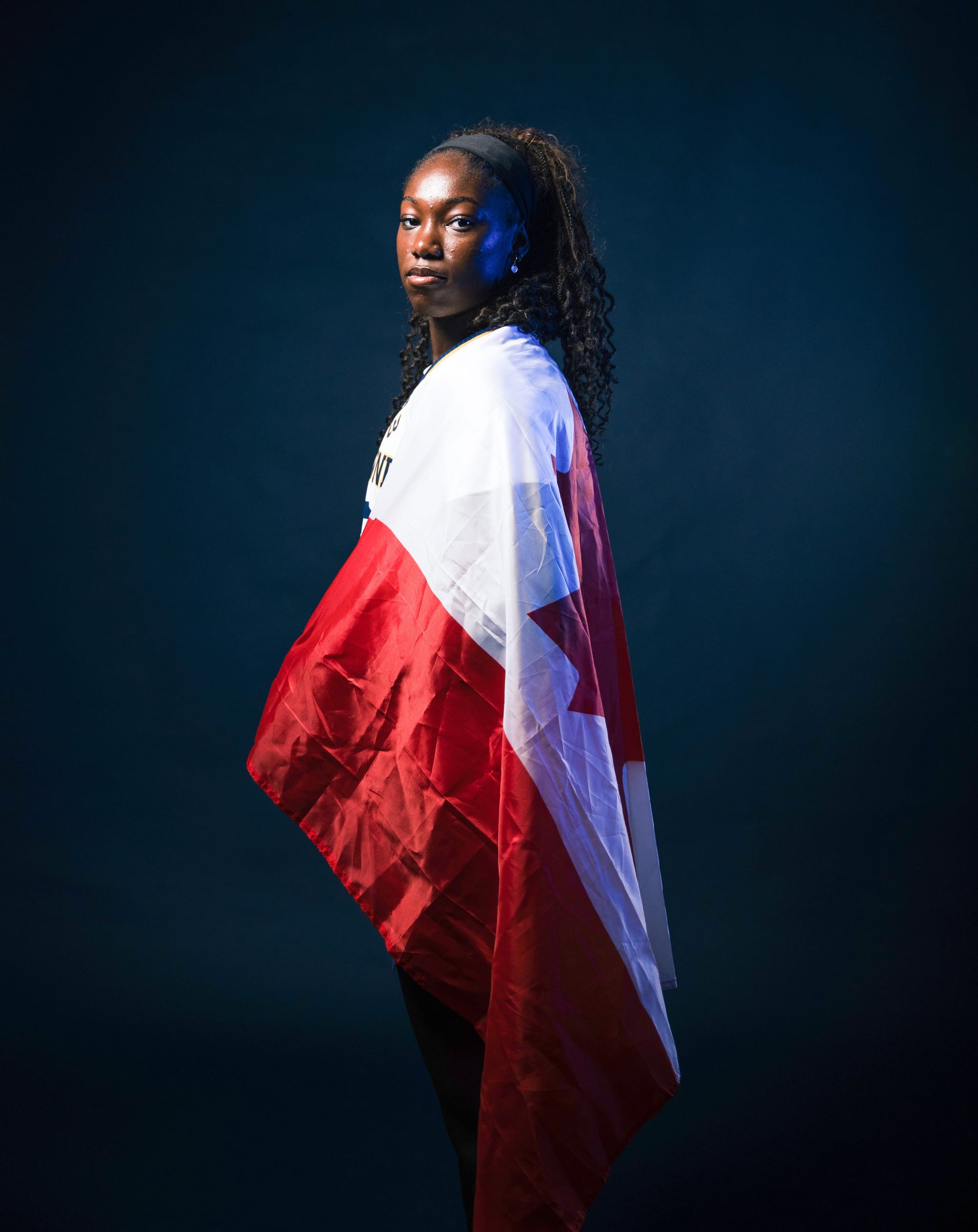
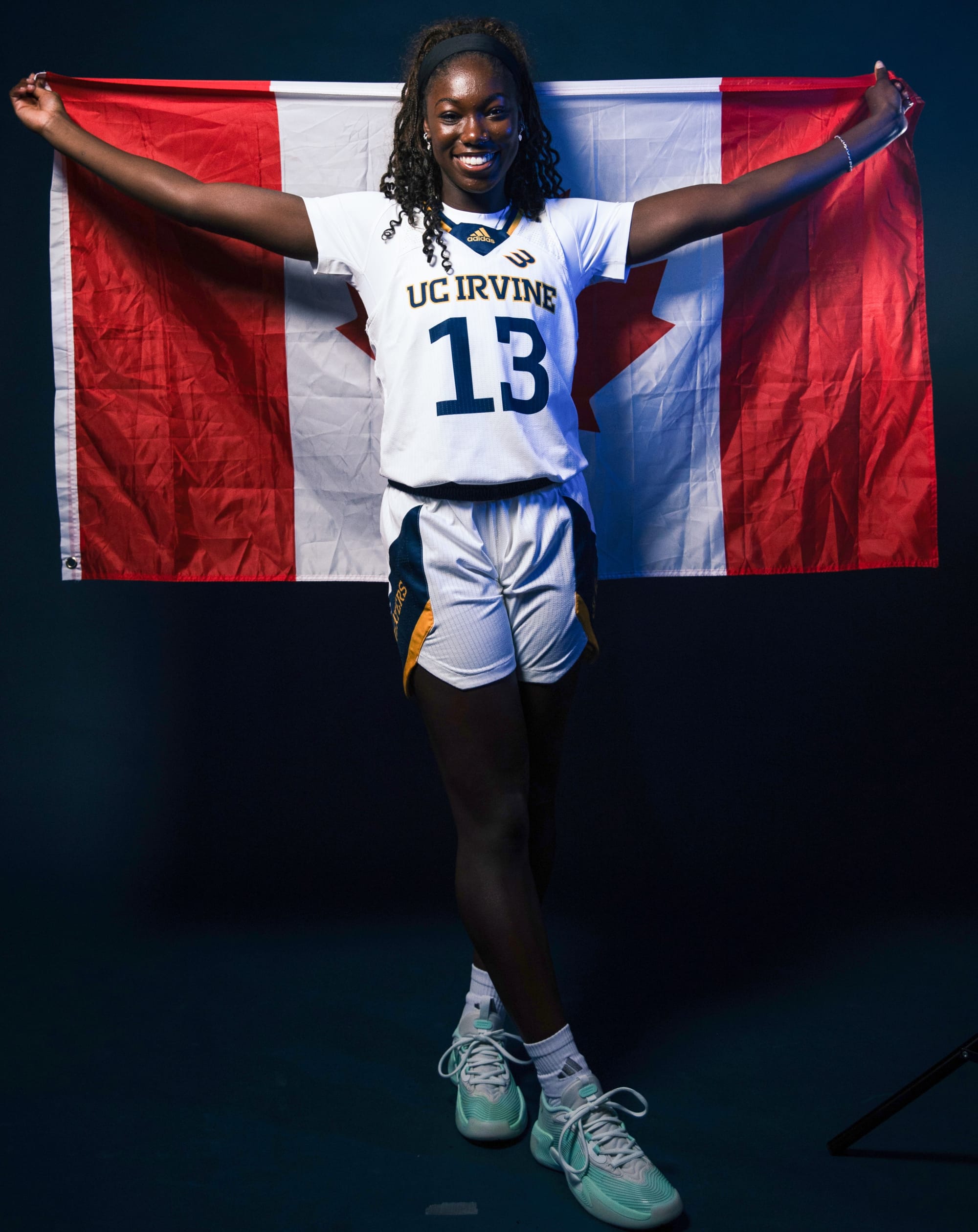
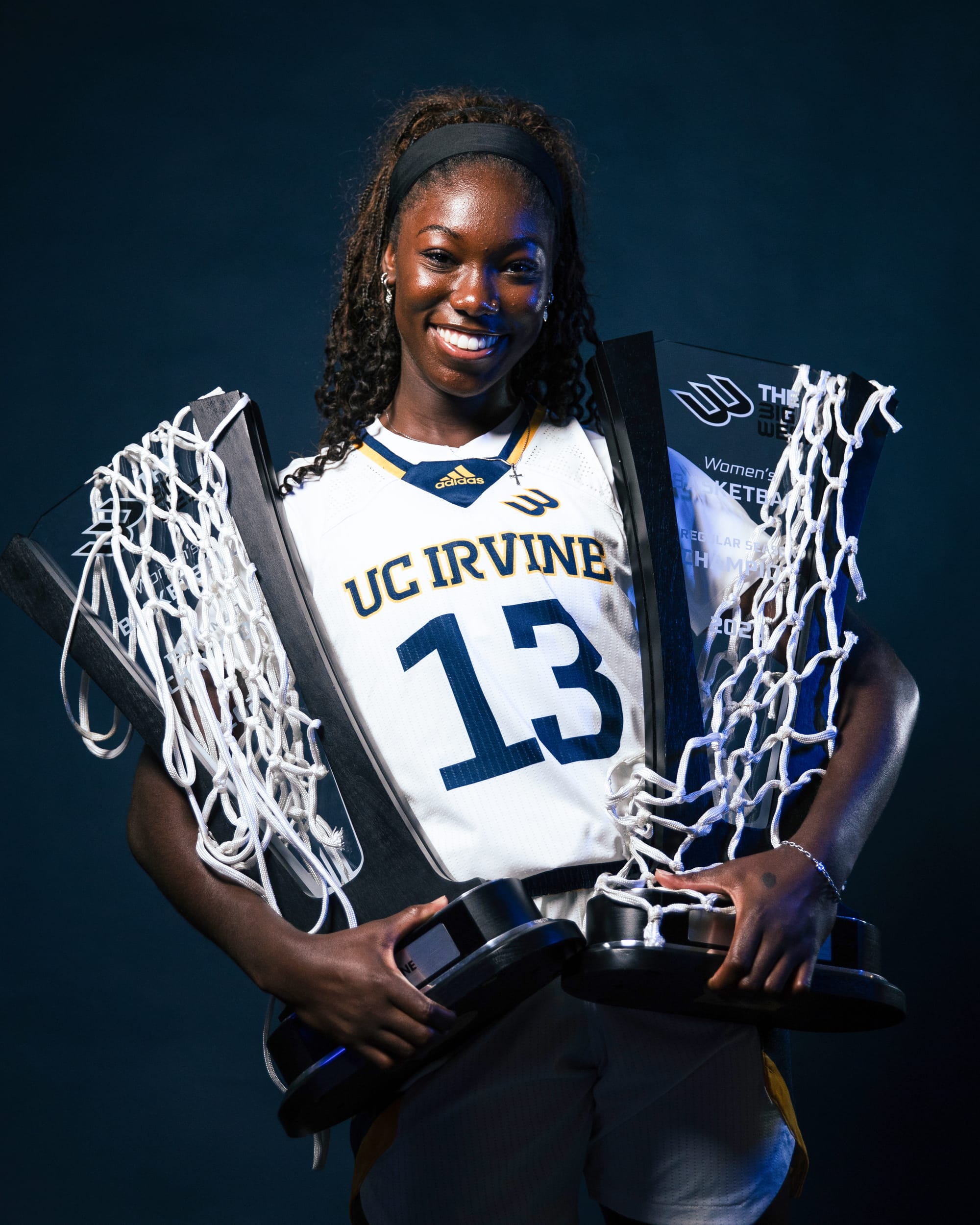
The Vancouver, British Columbia native was the Big West Conference Player of the Year last season. [Courtesy photos]
But then you hear about the other pieces of her path, and you wonder if it’s her brain that delivers the magic instead.
She was a young soccer prodigy with a defined path toward stardom, big schools and maybe a professional career. No hands required. She was a center-back who protected the space in front of the goal, taking joy in the angles and the anticipation of contact. Nullifying plays. Squashing hope. Sealing victories.
Her brain fueled a curious and eager student, one who found herself at an elite research and science institution in another country 1,300 miles from home. Here, she overcame self-doubt, real-world challenges and a confidence problem in the classroom and on the court.
The power of her mind helped flip some switches — a word she often used in our conversation — to solve her academic anxieties and propel her from conference honorable mention to player of the year honors in one season.
Confidence. A trait she admits has eluded her at times. With it, she sees a future, one that includes a Black doctor caring for Black patients, something she never experienced growing up. She sees a possible professional basketball stop in Europe next year, stretching the cord of her life’s passion just a little longer.
The hands … the mind … once upon a time they may have worked independently. But when her neurons started working in concert, it all came together, her orchestra of talents now on full display.
Déja Lee slipped through the lower doors of the Bren Events Center, backlit by a golden morning sun. She is sporting full college athlete attire — sweatpants, hoodie, backpack. Her long hair is pulled back from her face and her mega-watt smile is quick to greet, along with an extended hand and a casual repose that puts everyone at ease.
The senior guard is prepping for her final season at the University of California-Irvine with outsized expectations both in the classroom and with her teammates. Last season, her Big West Conference Player of the Year status helped push the Anteaters into the NCAA tournament.
But unlike some of the more recognized California public universities with large athletic ambitions (ahem, UCLA), UCI’s students fully understand their unofficial status as a public Ivy is dependent on the strength of its educational fortress rather than the merits of its student-athletes.
Which is why here, on this well-manicured campus five miles from the azure blue waters of the Pacific and shaded by an arborist’s fantasy of tree types — from eucalyptus to jacaranda to dwarf redwoods — you can find a stud baller working complex research problems in a lab where the human brain is more than a curiosity.
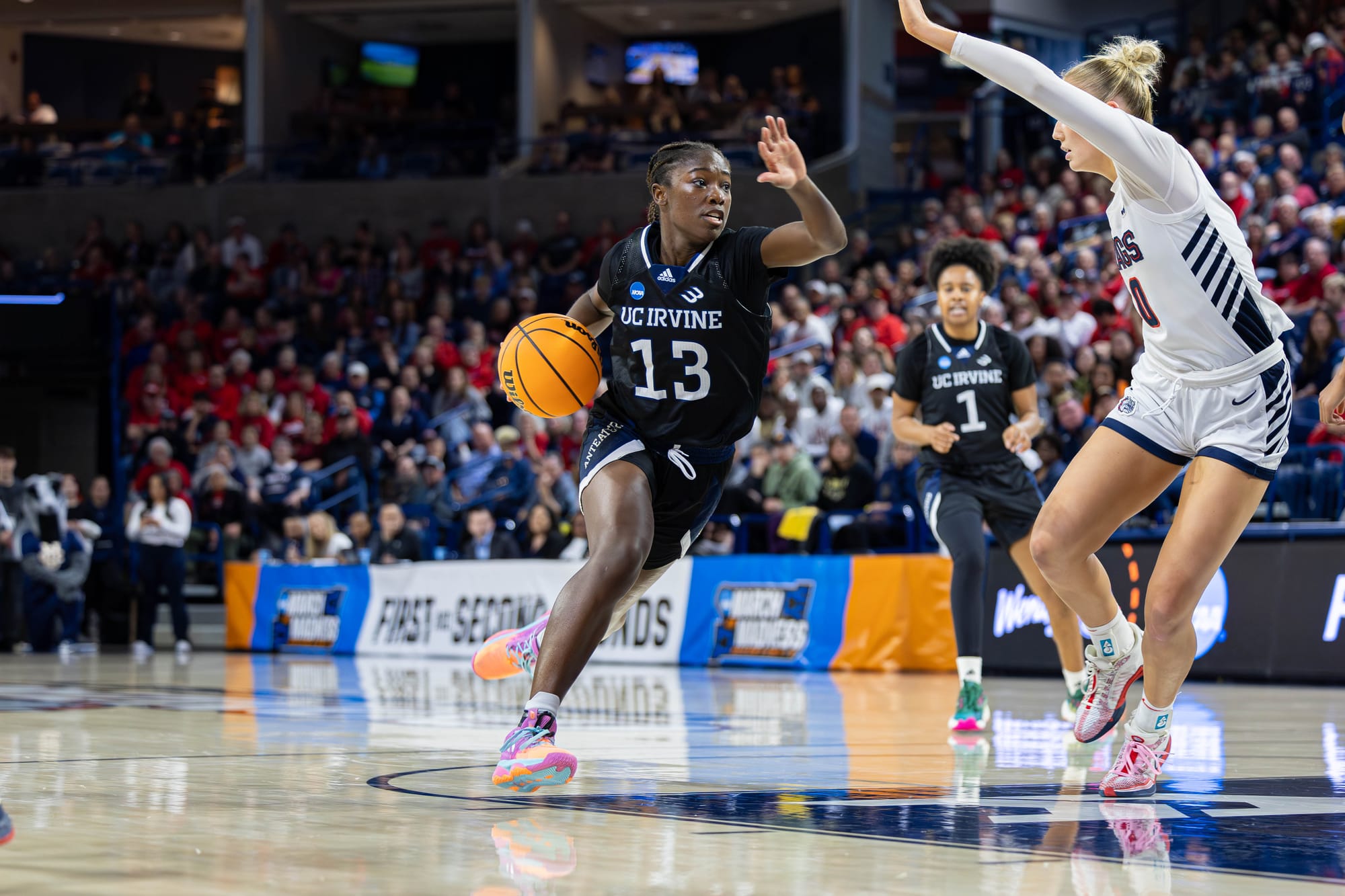
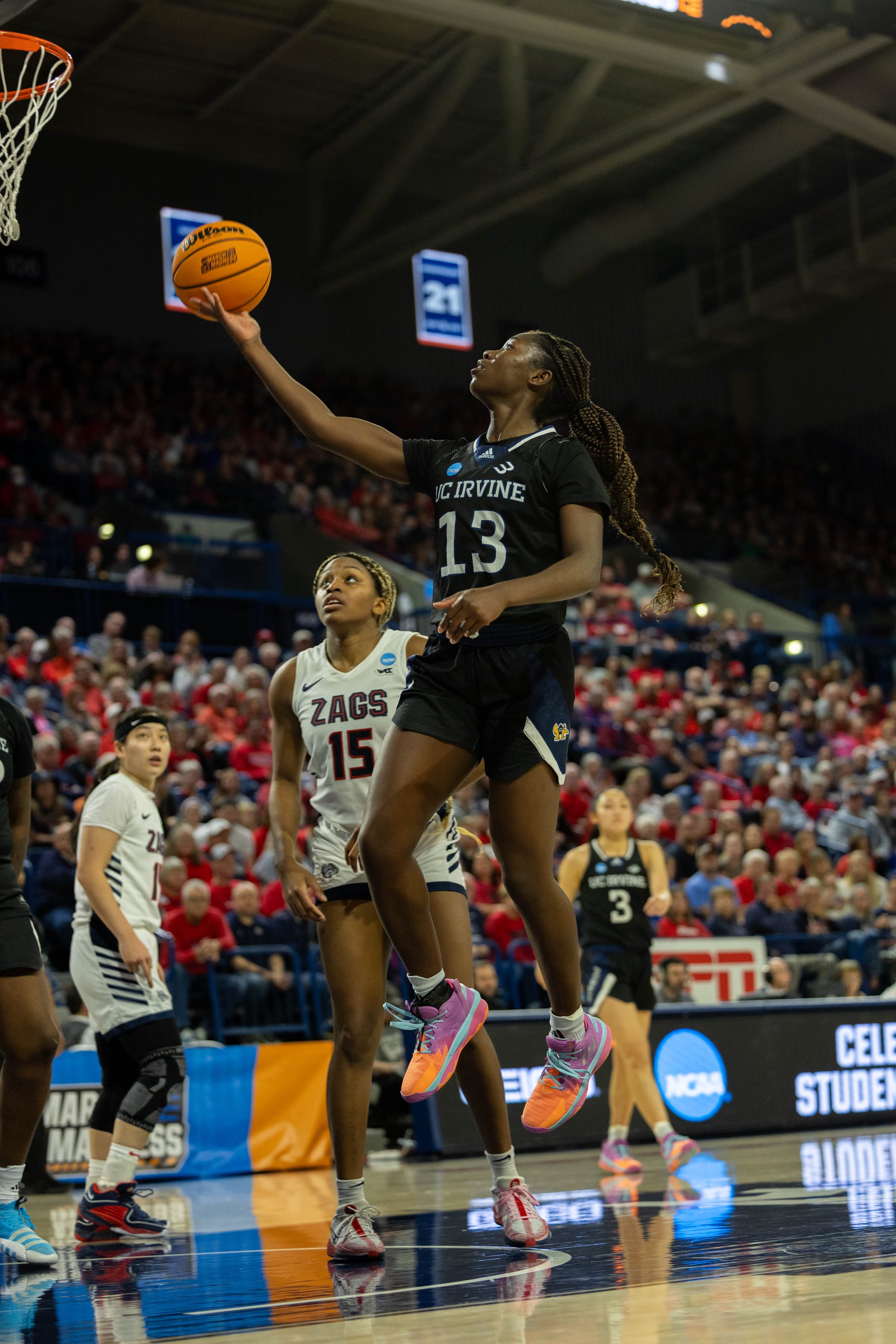
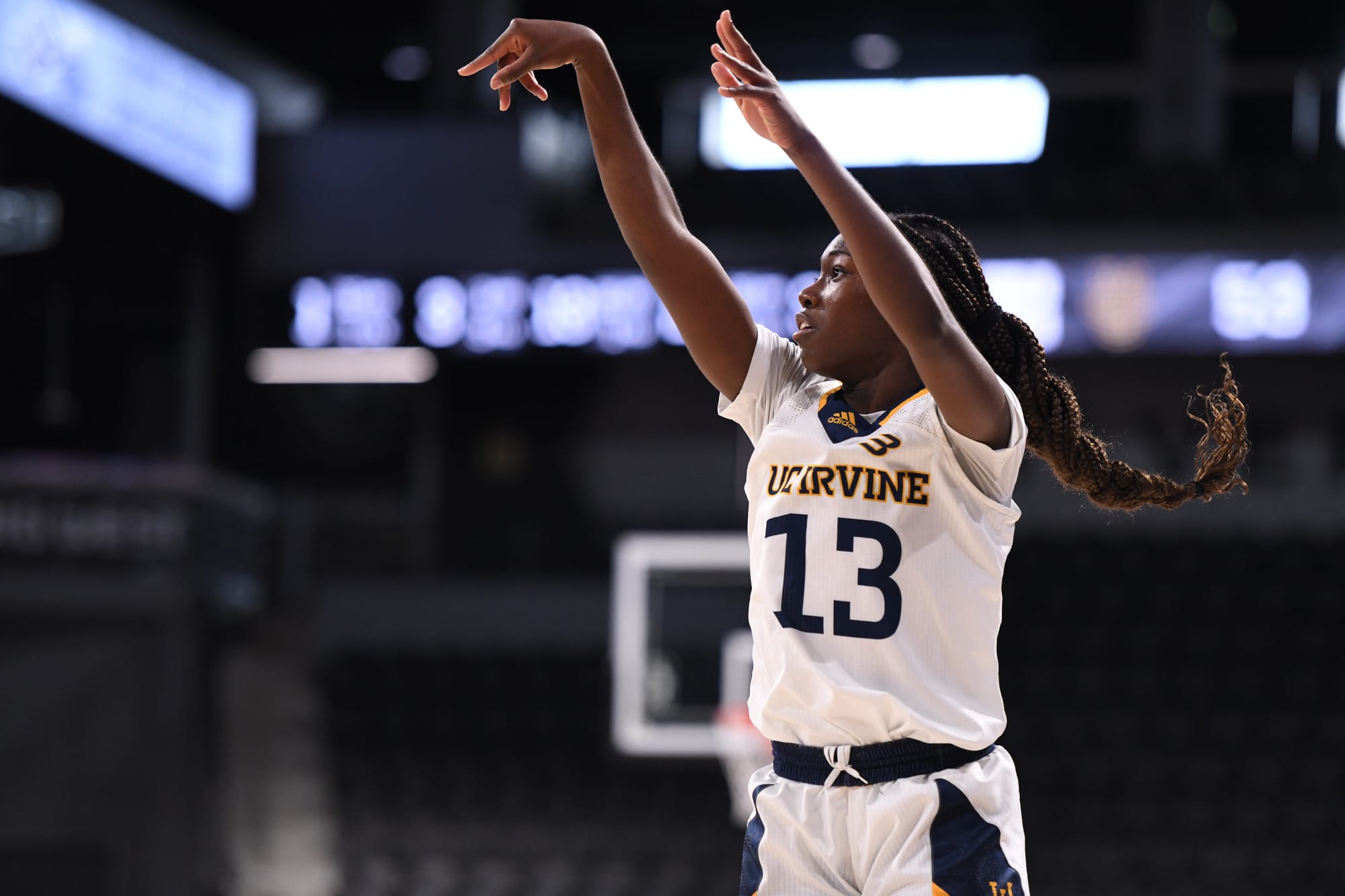
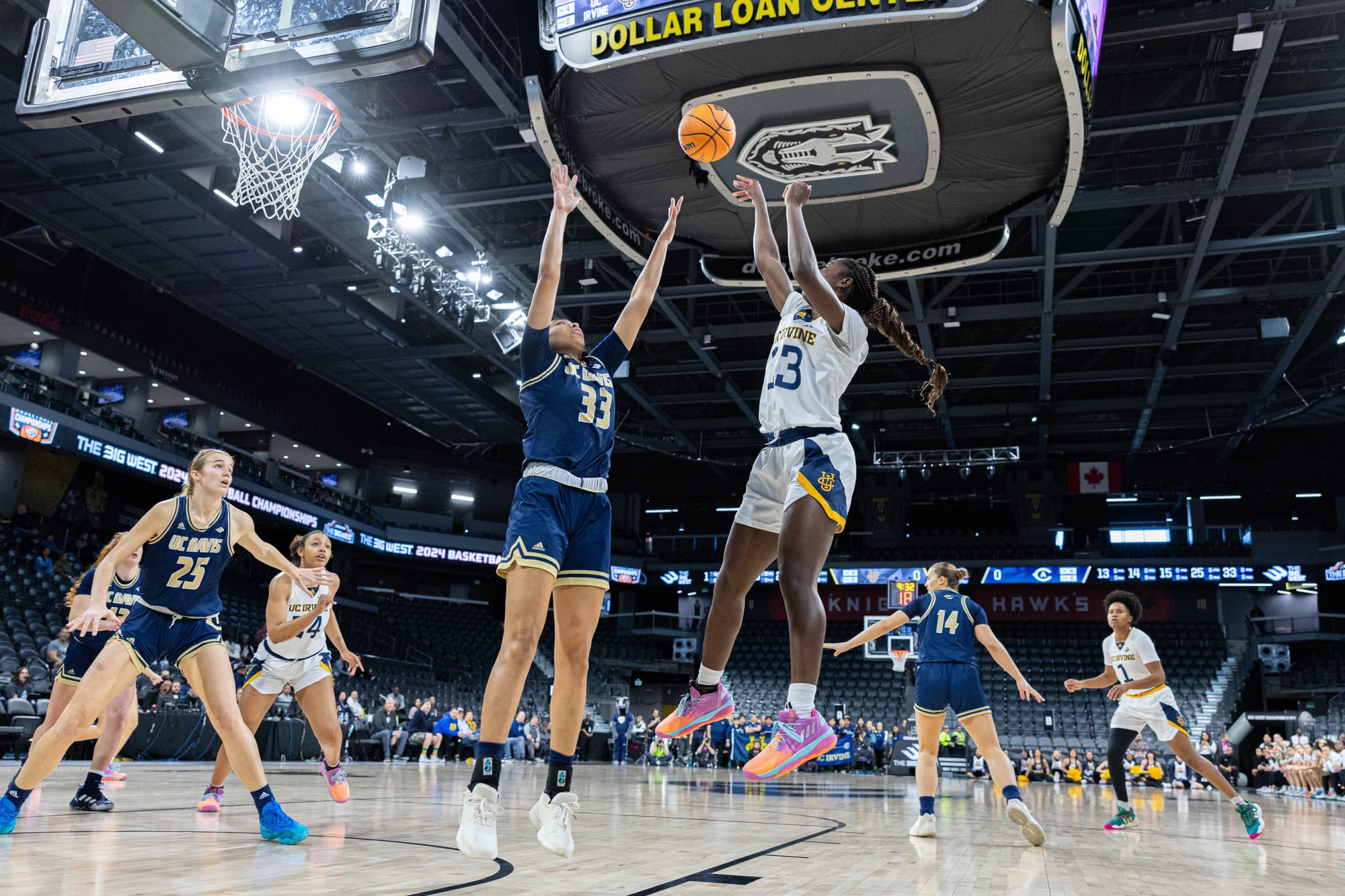
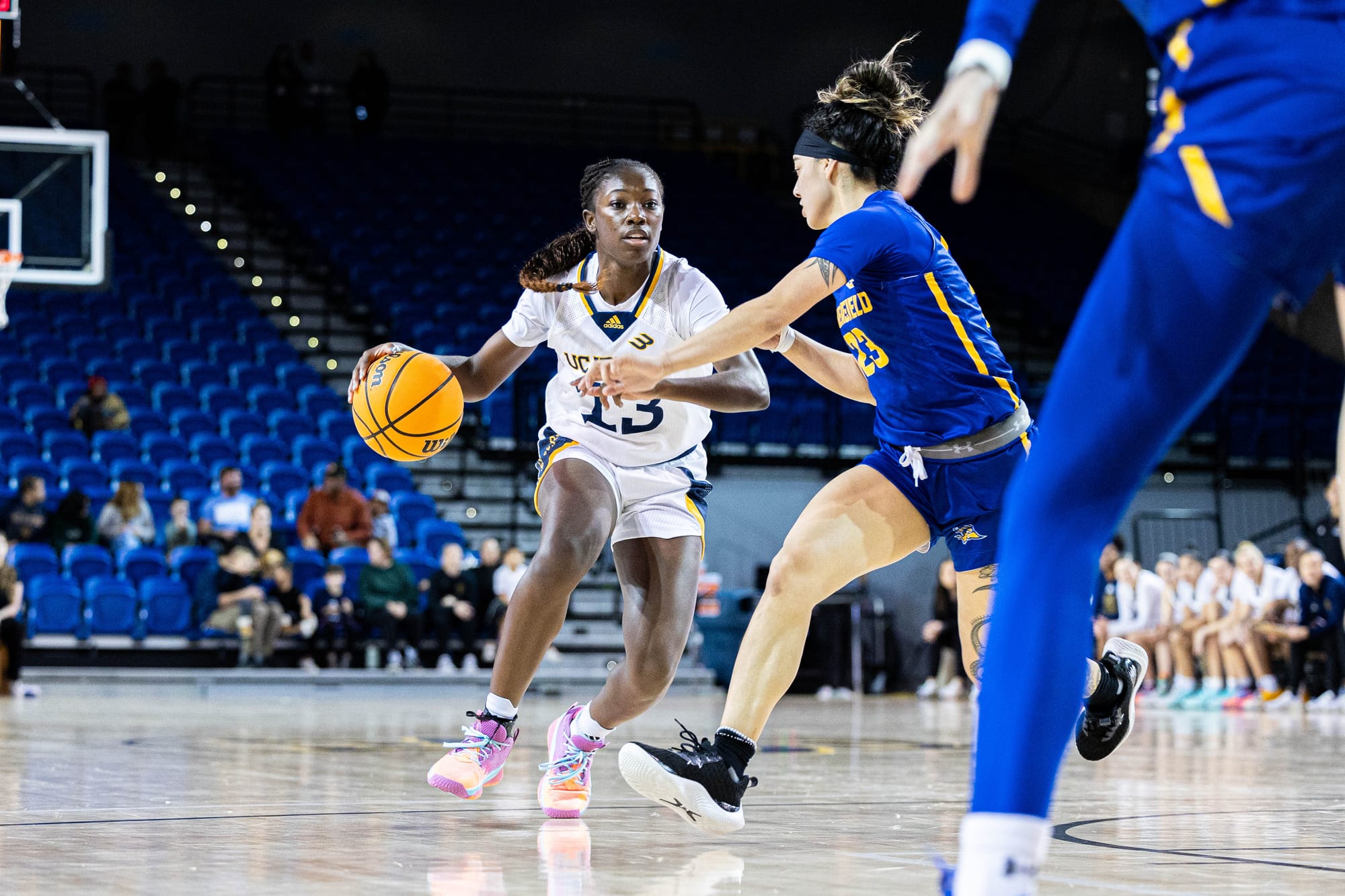
UC-Irvine made the NCAA tournament last season. Now, with her POY status, Lee has a bullseye on her back. [Courtesy photos]
In a small room stuffed with folding tables, office chairs and the hum-click-buzz of a mini-refrigerator tucked in the corner, Déja sat down, crossed her legs and prepared for an onslaught of questions about her journey, which began further up the West Coast and across the international border with Canada.
The oldest child of Roxane and Brian Lee was born with the athlete gene. Mom was a college volleyball player. For Dad, it was college basketball. Her two younger brothers are also athletes, with Torian, a freshman on the UCI men’s basketball team, and Zane, still in high school.
Growing up in Vancouver, British Columbia, basketball wasn’t a given. She had another sport vying for her heart of hearts.
“Soccer was my favorite sport, and I started at five and did that all the way up until grade nine. And I told my dad — I distinctly remember this because I hated watching and basketball would always be on the TV and he's a huge Lakers fan. So we'd always just sit in the living room and I'd want to watch cartoons and he would want to watch the Lakers play.
“And I'd say, ‘Dad, you know I'm never going to play basketball. Like I told him that. I remember that, and he just laughed at me. And here we are,” she says, flashing a defeated but happy smile.
Like many multi-sport star athletes, Déja had a decision to make as she got older. With soccer being her first love and the sport where her early athletic identity was born, she was invited to join the Vancouver Whitecaps developmental program. This was a big deal.
“I was asked to play for the women’s program, which is like a funnel into the bigger program … a lot of my teammates went into the program and they went to high major schools like the Miamis and the Michigans. If you stay in that program, you’re on track for the national team,” Déja says.
As parents do, her father gently suggested scenarios that maybe she hadn’t considered. If he intended to make sure she was thoroughly evaluating her choices, he succeeded.
“My dad, who was still coaching my teams at the time, he said, ‘Would you be okay with sitting in the stands and watching all your friends and your teammates compete and play basketball, and you're sitting and not playing?’
Déja turned down the Whitecaps offer because she didn’t want to attend a different school and passionately wanted to continue playing with her friends.
“And so that was a tough decision because I kind of knew where my spot was on that team in terms of what they expected from me. And so turning that down was like, ‘Oh, I can make them really upset.’ But I think in my mind it was the right decision at the time.
“And I still stand by that. And so I continued with basketball. I was lucky enough to go to school with my two best friends in high school. One of them goes to Washington State now. The other goes to UCSD (University of California - San Diego). And we all had the opportunity to play on the Canadian national team when we were 16 years old.”
In what little free time she has, Déja likes to read non-fiction (mind magic returns!) and play with legos (the hands are back!). True story. She’s currently building a toucan.
It is now, in the golden hour of her athletic journey, we see the melding of mind and body. It all started coming together last season — both academically and athletically.
She can point to a specific moment in time when she felt like she finally belonged. Early in her journey at UCI, she doubted whether she was capable of managing the education component.
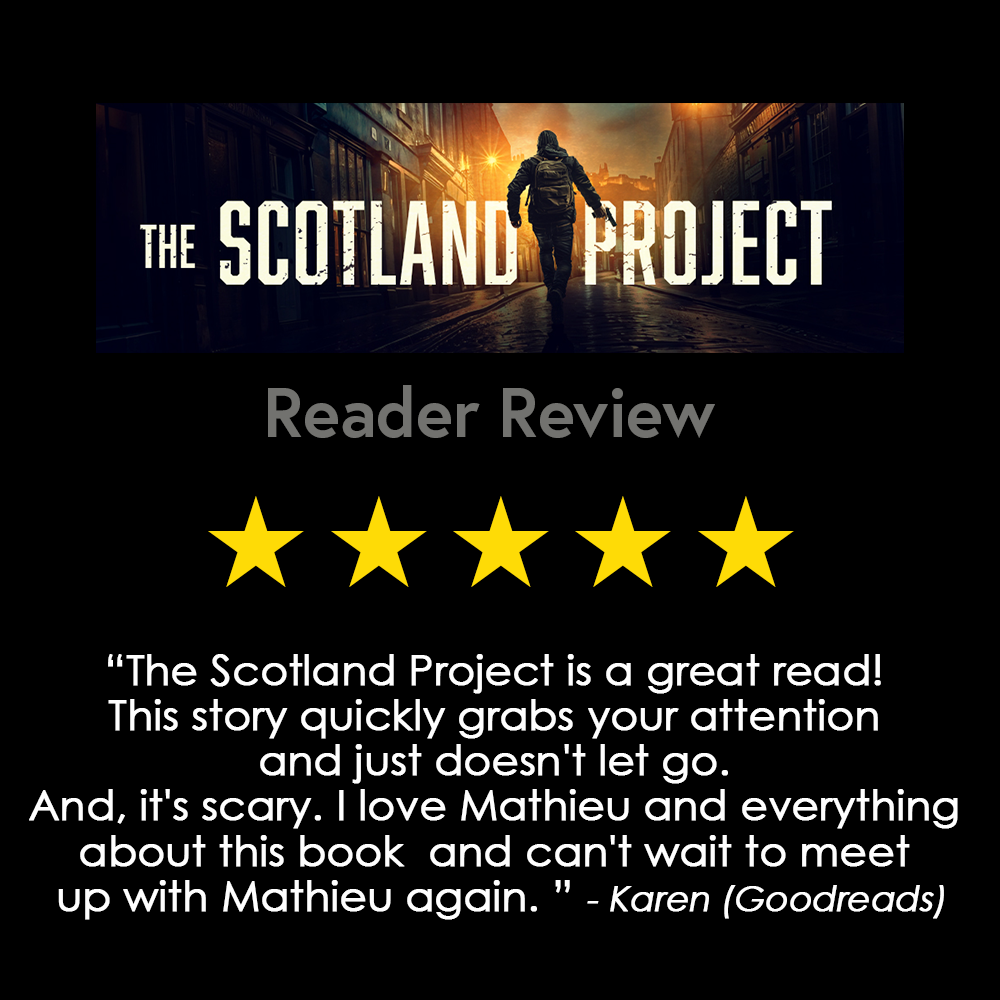
“I was truly questioning, ‘Can I do this?’ It was always the question, it was never, ‘Do I want to?’ It's really ‘Am I capable of this?' I would still find myself in opportunities to do research, to be part of labs. Even though I wasn't doing great academically, those opportunities still found me, and I took that as a sign of I'm exactly where I need to be.
“This was specifically in my sophomore year leading up to my junior year when I started to kind of find that balance with academics and sports. I joined the lab, and I was so nervous at first because I was like, ‘Well, everyone in this lab probably has like a 4.0, and I don't and I don't know if I'm going to be able to understand the concepts and things like that.’
“But they took me in and I think that was the biggest sign of, ‘I can continue to do this, regardless of the things that aren't going well right now.’ I have to trust that in the end, everything will be worked out. And then on top of that, I had the opportunity to conduct my own personal research.”
The newly discovered swagger in the classroom carried over onto the hardwood.
“I have struggled with confidence on the court, specifically from an offensive perspective. For me, it's kind of like a switch that turned on. I realized, ‘Oh, I actually can do this when I work hard enough in the gym, I'm hitting my shots in practice. I can kind of take that risk in games. And it ended up working out.”
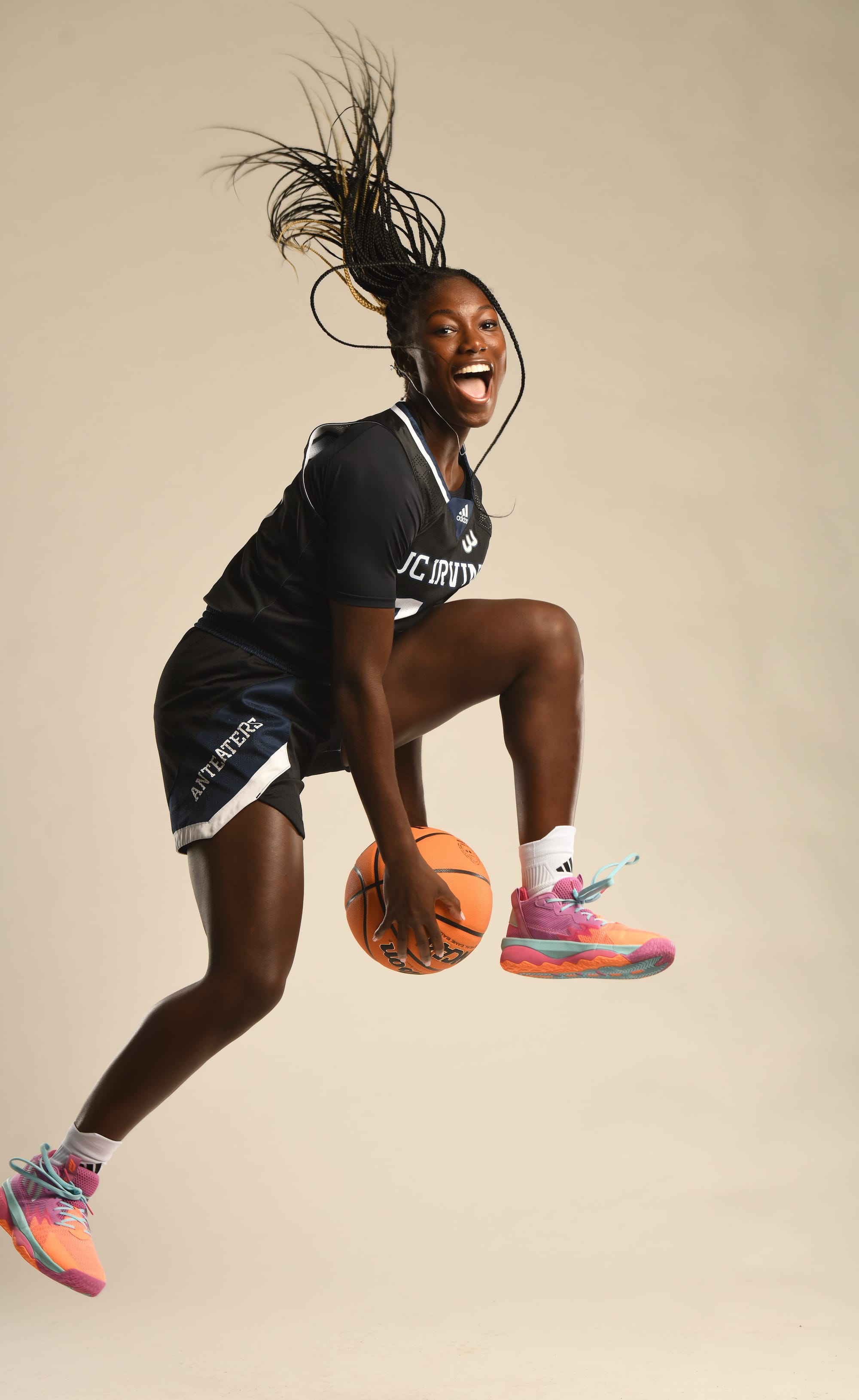
Part of her adjustment to college was more than the usual time management skills. Covid-19 hit her senior year in high school, which meant she missed an important development cycle heading into her freshman season at UCI. She joined another female friend and played in the men’s league, trying to stay sharp in a space where males don’t like to pass the ball, especially to females.
She had experienced this mentality many times, having grown up playing with boys. What she learned was this: The best way to be accepted is to prove yourself. But with the missed pandemic season, she had more doubts about her readiness.
“For me, I did limit myself a little bit. And I think that might have been just from not playing in my grade 12 year to going straight to college basketball. That really affected my confidence as a player. And so I think I had to kind of rebuild those skills, that court awareness and that confidence to be able to do the things that I did on the court.”
Looking ahead to a season where she’ll be wearing the bullseye as the conference’s top player, she has measured expectations for herself. Notably, she is working to become a more vocal leader and use her best trait to grind through defenses and make a difference.
“I’m a very stubborn person, and I think I bring that on the court. I’m like, ‘No, I’m not letting you do that. No matter how hard you try I’m going to put in that much more effort to make sure that you don’t do what you’re supposed to do.”
A devout fan of Milwaukee Bucks guard Damian Lillard, she seeks to model her basketball and mental traits after the clutch shooter nick-named ‘Dame Time.”
“I just like how confident he is without having to be so performative in terms of when he hits a shot. At the end of the day, he lets his game speak for him.”
Déja has found a balance between learning from failure and embracing achievement. In these early chapters of her life, she has devoted energy to her faith, her friends and her family. Her travels with the Canadian national team took her places she had only dreamed of, and whet the appetite for more exploration.
Perhaps the most interesting thing we discussed, which came right at the end, was her brother Torian. This was important to her, to speak of him, to share a slice of family pride.
“I would say just one thing — how proud I am of my brother being here. I think it's a really cool experience having a sibling at your school, let alone playing the same sport as you, let alone playing in the same gym. I'm just proud of him. In terms of kind of the journey he had to get here, he had no idea that he would be here,” Déja says.
“I'd say eight months ago, he was a late recruit, because he had the intention of staying at his prep school. So it was for him, trying to juggle, ‘Do I want to stay at the school for another year? I have this opportunity to come to UCI.’ And I think he was also struggling with, you're here because you got here on your own. It has nothing to do with me.”
Even though they’re on the same campus, they rarely see each other, but make time for dinner together at least once a month. And then there’s the daily FaceTime, she adds, her smile getting impossibly wider at the thought.
“I just hope he knows. I’m just so proud of him.”
Interview complete, she offered a sincere appreciation for the opportunity, said goodbye and retreated through the same doors she entered, the morning sun now greeting her skin as she strolled toward a bike rack, unlocked an electric scooter and gracefully eased her slender 5-foot-9 frame onto the narrow platform and rolled off into the beaming light, illuminating the brightest of futures.
The Scotland Project, the debut novel from Matthew Fults, is available now from your favorite bookseller.
